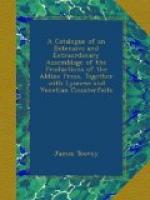WINTER PICTURES FROM THE POETS.
Although English Poetry abounds with pictures of the seasons, its Winter pictures are neither numerous, nor among its best. For one good snow-piece we can readily find twenty delicate Spring pictures—twinkling with morning dew, and odorous with the perfume of early flowers. It would be easy to make a large gallery of Summer pictures; and another gallery, equally large, which should contain only the misty skies, the dark clouds, and the falling leaves of Autumn. Not so with Winter scenes. Not that the English poets have not painted the last, and painted them finely, but that as a rule they have not taken kindly to the work. They prefer to do what Keats did in one of his poems, viz., make Winter a point of departure from which Fancy shall wing her way to brighter days:
“Fancy, high-commissioned; send
her!
She has vassals to attend her,
She will bring, in spite of frost,
Beauties that the earth hath lost,
She will bring thee, all together,
All delights of summer weather.”
But we must not let Keats come between us and the few among his fellows who have sung of Winter for us. Above all, we must not let him keep his and our master, Shakspeare, waiting:
“When icicles hang by the wall,
And Dick the shepherd blows his nail,
And Tom bears logs into the hall,
And milk comes frozen home in pail,
When blood is nipped, and ways be foul,
Then nightly sings the staring owl,
To-whoo;
To-whit, to-whoo, a merry note,
While greasy Joan doth keel the pot.
“When all aloud the wind doth
blow,
And coughing drowns the parson’s saw,
And birds sit brooding in the snow,
And Marian’s nose looks red and raw.
When roasted crabs hiss in the bowl,
Then nightly sings the staring owl,
To-whoo;
To-whit, to-whoo, a merry note,
While greasy Joan doth keel the pot.”
From Shakspeare to Thomson is something of a descent, but we must make it before we can find any Winter poetry worth quoting. Here is a picture, ready-made, for Landseer to put into form and color:
“There, warm together pressed, the trooping deer
Sleep on the new-fallen snows; and scarce his head
Raised o’er the heapy wreath, the branching elk
Lies slumbering sullen in the white abyss.
The ruthless hunter wants nor dogs nor toils,
Nor with the dread of sounding bows he drives
The fearful flying race: with ponderous clubs,
As weak against the mountain-heaps they push
Their beating breast in vain, and piteous bray,
He lays them quivering on the ensanguined snows,
And with loud shouts rejoicing bears them home.”
Cowper is superior to Thomson as a painter of Winter, although it is doubtful whether he was by nature the better poet. Here is one of his pictures:




